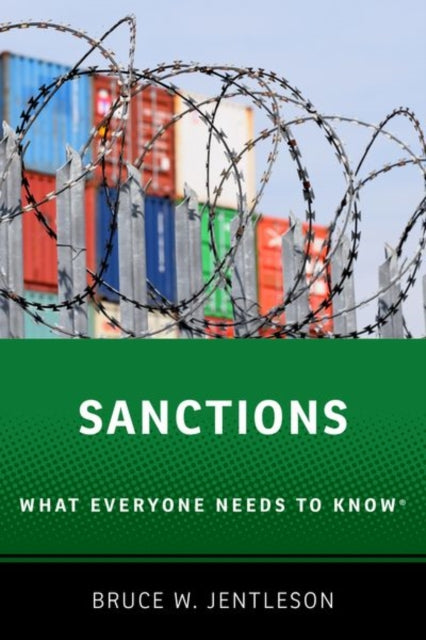Bruce W.Jentleson
Sanctions: What Everyone Needs to Know (R)
Sanctions: What Everyone Needs to Know (R)
YOU SAVE £3.72
- Condition: Brand new
- UK Delivery times: Usually arrives within 2 - 3 working days
- UK Shipping: Fee starts at £2.39. Subject to product weight & dimension
Bulk ordering. Want 15 or more copies? Get a personalised quote and bigger discounts. Learn more about bulk orders.
Couldn't load pickup availability
- More about Sanctions: What Everyone Needs to Know (R)
Economic sanctions are used by countries to punish each other and are a major phenomenon in world politics. Bruce Jentleson's book "Sanctions: What Everyone Needs to Know®" provides an overview of why they are used, their varieties, and the key factors affecting their success. He demonstrates that examining sanctions is key to understanding international relations and that they will likely continue to bear on global politics.
Format: Paperback / softback
Length: 256 pages
Publication date: 08 December 2022
Publisher: Oxford University Press Inc
Economic sanctions are a significant and complex phenomenon in world politics, with one country imposing penalties on another as a form of punishment or retaliation. These sanctions can take various forms, including asset freezes, trade restrictions, and travel bans, and are often used to exert pressure on countries to comply with specific political or economic demands.
The use of economic sanctions has become increasingly prevalent in recent years, with major powers such as the United States, Russia, China, Japan, South Korea, Saudi Arabia, Qatar, France, Germany, and Norway all employing them as tools in their international relations. Sanctions have been used for a wide range of purposes, including responding to human rights abuses, promoting democracy, and countering terrorism and proliferation.
However, the use of economic sanctions is not without its critics. Some argue that they can have unintended consequences, such as harming innocent civilians and exacerbating economic instability. Others argue that sanctions are a form of economic warfare that can undermine international cooperation and lead to further conflict.
Despite these concerns, economic sanctions are likely to remain a significant feature of international relations in the years to come. As Bruce Jentleson, one of America's leading scholars on the subject, argues in his book "Sanctions: What Everyone Needs to Know®," examining sanctions is essential to understanding international relations and predicting how they will likely continue to shape global politics.
One of the key questions that Jentleson addresses in his book is why sanctions are used so frequently. He argues that sanctions are often used as a tool of last resort when other diplomatic and political measures have failed. Sanctions can be particularly effective in situations where a country is unwilling to comply with international norms or where there is a significant risk of conflict.
Jentleson also discusses the various types of economic sanctions that are available to countries. These include asset freezes, trade restrictions, and travel bans. Asset freezes, for example, prevent individuals or companies from accessing their financial assets, while trade restrictions limit the ability of a country to trade with other countries. Travel bans prevent individuals from entering or leaving a country.
Another important factor that affects the success of economic sanctions is the level of international cooperation. Sanctions require the cooperation of multiple countries to be effective, and countries may be reluctant to cooperate if they believe that the sanctions are being used against them unfairly or disproportionately.
Jentleson also examines the key factors that determine the effectiveness of economic sanctions. These include the severity of the sanctions, the duration of the sanctions, and the level of compliance with the sanctions. Severe sanctions, for example, that impose significant economic penalties on a country, are more likely to be effective than mild sanctions that impose only symbolic penalties.
In addition to their use as a tool of international relations, economic sanctions have also been used as a means of promoting political change. For example, sanctions have been used to pressure countries to reform their political systems, such as by ending human rights abuses or promoting democracy.
However, the use of economic sanctions can also have unintended consequences. For example, sanctions can harm innocent civilians by exacerbating economic instability and reducing access to essential goods and services. They can also lead to political instability and conflict, as countries may respond to sanctions by increasing their support for extremist groups or engaging in military aggression.
Despite these concerns, economic sanctions are likely to remain a significant feature of international relations in the years to come. As Jentleson argues in his book, examining sanctions is essential to understanding international relations and predicting how they will likely continue to shape global politics. By understanding the reasons why sanctions are used, the various types of sanctions available, and the factors that determine their effectiveness, countries can better navigate the complex and often unpredictable world of international relations.
Weight: 336g
Dimension: 211 x 141 x 26 (mm)
ISBN-13: 9780197530320
This item can be found in:
UK and International shipping information
UK and International shipping information
UK Delivery and returns information:
- Delivery within 2 - 3 days when ordering in the UK.
- Shipping fee for UK customers from £2.39. Fully tracked shipping service available.
- Returns policy: Return within 30 days of receipt for full refund.
International deliveries:
Shulph Ink now ships to Australia, Belgium, Canada, France, Germany, Ireland, Italy, India, Luxembourg Saudi Arabia, Singapore, Spain, Netherlands, New Zealand, United Arab Emirates, United States of America.
- Delivery times: within 5 - 10 days for international orders.
- Shipping fee: charges vary for overseas orders. Only tracked services are available for most international orders. Some countries have untracked shipping options.
- Customs charges: If ordering to addresses outside the United Kingdom, you may or may not incur additional customs and duties fees during local delivery.


